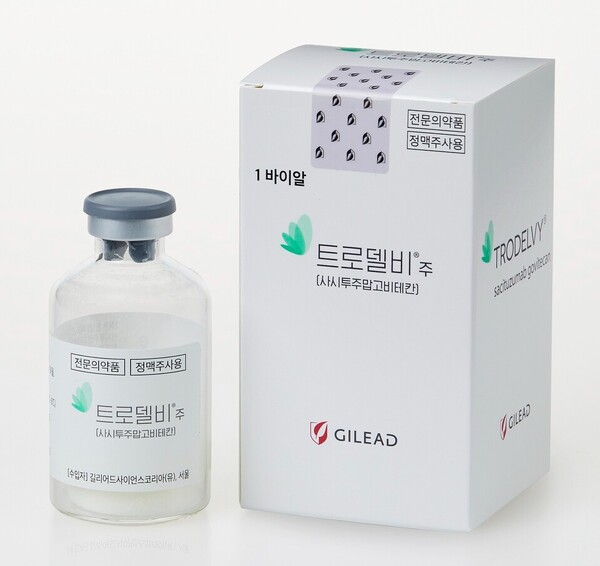Gilead's triple-negative breast cancer treatment Trodelvy (trastuzumab govitecan) had surmounted a significant hurdle for health insurance coverage.

It is the first drug allowed to be elastically applied by the incremental cost-effectiveness ratio (ICER)’s threshold value, passing the Pharmaceutical Reimbursement Evaluation Committee (PREC) under the Health Insurance Review and Assessment Service (HIRA).
Bayer's pulmonary hypertension drug Adempas (riociguat), UCB's psoriasis drug Bimzelx (bimekizumab), and Lilly's atopic dermatitis drug Ebglyss (lebrikizumab: genetic recombinant) were also recognized for new reimbursement. Ipsen's Cabometyx (cabozantinib) was recognized as appropriate for benefit expansion.
HIRA said it made these and other decisions in the PREC meeting on Thursday.
The drug benefit panel rediscussed and passed the new reimbursement for Trodelvy.
The decision on new coverage comes one year and three months after Trodelvy passed the Cancer Disease Review Committee (CDRC) in November 2023. In May of that year, it won approval from the Ministry of Food and Drug Safety(MFDS).
“We recognized the appropriateness of the salary for the anticancer drug 'Trodelvy, which is used for triple-negative breast cancer patients,” HIRA said. “This is the first example of the improved system pushed to enhance patient access to new drugs recognized as innovative.”
In August last year, HIRA revised the “Detailed Evaluation Criteria for New Drugs and Other Drugs Subject to Negotiation” to specify the “innovation” evaluation criteria. It specifically defined the meaning of “innovativeness,” one of the ICER threshold evaluation factors, to establish a standard for evaluating the appropriate value of new drugs.
As a result, a new drug is recognized as innovative if it meets all three requirements: there is no substitute or therapeutically equivalent product or treatment; a significant clinical improvement in the outcome indicator, such as prolongation of survival; and it falls under Article 35(4)(2) of the Pharmaceutical Affairs Act and is recognized by the MFDS as a new drug or equivalent drug approved through expedited review.
As a drug that meets all three requirements, Trodelvy became the first case to be recognized for the elastic application of the ICER threshold after the system was improved.
The reimbursement for Trodelvy will be finalized through drug price negotiations with the National Health Insurance Service (NHIS) and the Health Insurance Policy Review Committee of the Ministry of Health and Welfare.
In August last year, the PREC decided to give Trodelvy a “re-deliberation” decision, requiring the drugmaker to submit an additional financial sharing plan, including a price reduction. Gilead Korea spent about two months persuading its headquarters office to submit the plan, which it submitted to HIRA late last year.
The PREC has recognized Adempas, Bimzelx, and Ebglyss as appropriate for reimbursement.
Adempas was developed to treat pulmonary arterial hypertension (PAH) and chronic thromboembolic pulmonary hypertension (CTEPH) and was approved by the MFDS in June 2014. However, due to its high cost, it has not been covered by insurance and has been rarely prescribed.
The committee recognized the appropriateness of Adempas only for pulmonary arterial hypertension among its indications. If the upcoming negotiations with the NHIS are successful, Adempas will enter the reimbursement system 11 years after its domestic approval.
The interleukin (IL) inhibitors Bimzelx and Ebglyss were granted reimbursement on the condition that each drugmaker accept a price below the government's valuation.
Bimzelx, a biologic that simultaneously targets and inhibits IL-17A and IL-17F, was approved by the MFDS last August for treating moderate to severe plaque psoriasis in adult patients who require phototherapy or systemic therapy.
Ebglyss, a biologic that selectively blocks IL-13, was also approved by the MFDS in the same month for treating moderate to severe atopic dermatitis in adults and adolescents 12 and older (weighing 40 kg or more) who are not adequately controlled by topical treatments or for whom such treatments are not recommended.
A proposal to expand coverage for Cabometyx was also conditionally approved.
Cabometyx is now covered for “second or subsequent treatment of metastatic or recurrent clear cell renal cell carcinoma that has failed prior VEGFR TKI therapy.” Patients who have received prior immune checkpoint inhibitors were added to it.
Currently, Opdivo (nivolumab) and Yervoy (ipilimumab) are covered and used as a standard of care for the first-line treatment of patients with high-risk clear cell renal cell carcinoma. Real-world studies have demonstrated that Cabometyx can be effective in patients taking these immuno-oncology drugs, and reimbursement for second-line treatment needs to be improved.
If Ipsen accepts the price of Cabometyx at or below the government's valuation, Cabometyx monotherapy could soon be covered as a second-line treatment for patients who have used immuno-oncology drugs in their first-line treatment.
Related articles
- Insurance review panel gives green light to Tevimbra, Ofev, and Pemazyre
- Patient groups welcome Qarziba's reimbursement as 1st case of simultaneous approval, evaluation, negotiation
- Gilead’s Trodelvy awaits re-deliberation for reimbursement in Korea following patient petitions, price cut proposal
- Imfinzi gets go-ahead for reimbursement in 1st-line treatment of biliary tract and liver cancer
- Pfizer's AML drug denied insurance coverage; Roche, Lilly face conditional reimbursement for MS and ulcerative colitis treatments
- Weak insurance coverage forces blood cancer patients to seek life-saving treatments on their own
- 1st Trop-2 ADC Trodelvy expands indication to metastatic HR+/HER2- breast cancer
- 'Chemotherapy increases lymphedema risk after breast cancer surgery by 1.5 times'
- Patients celebrate Trodelvy reimbursement, but warn access delays still cost lives
- Gilead’s Trodelvy wins Korean coverage for breast cancer -- too late for some and still off-limits up front

